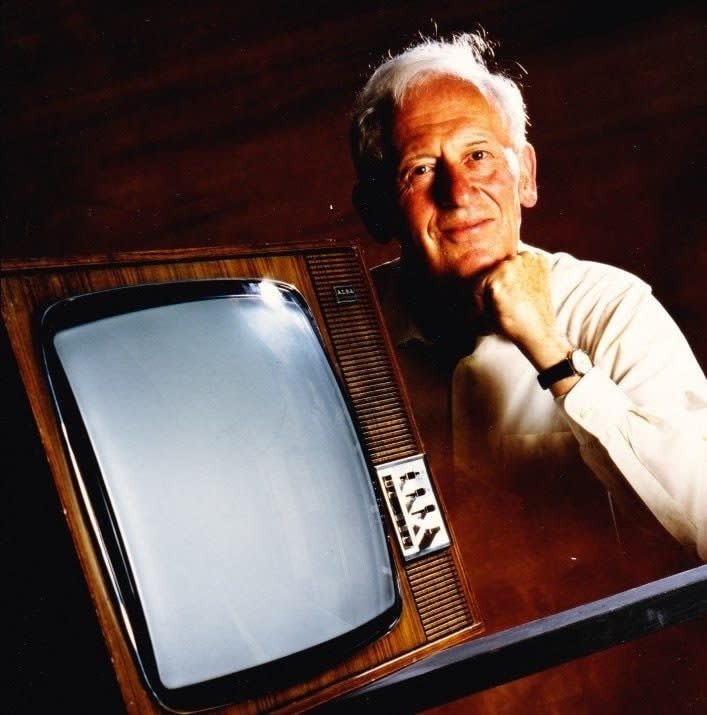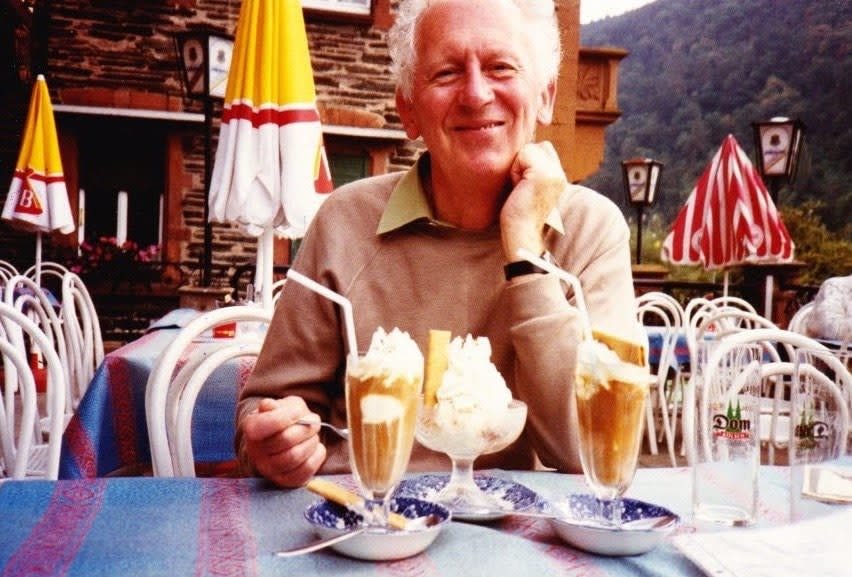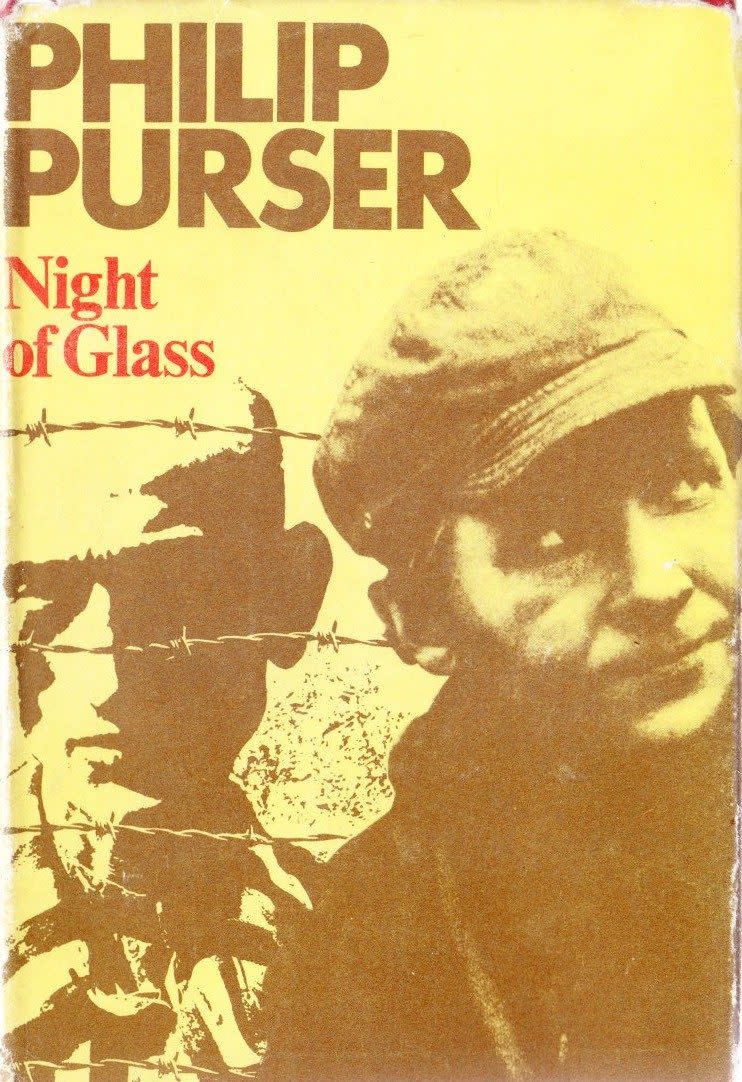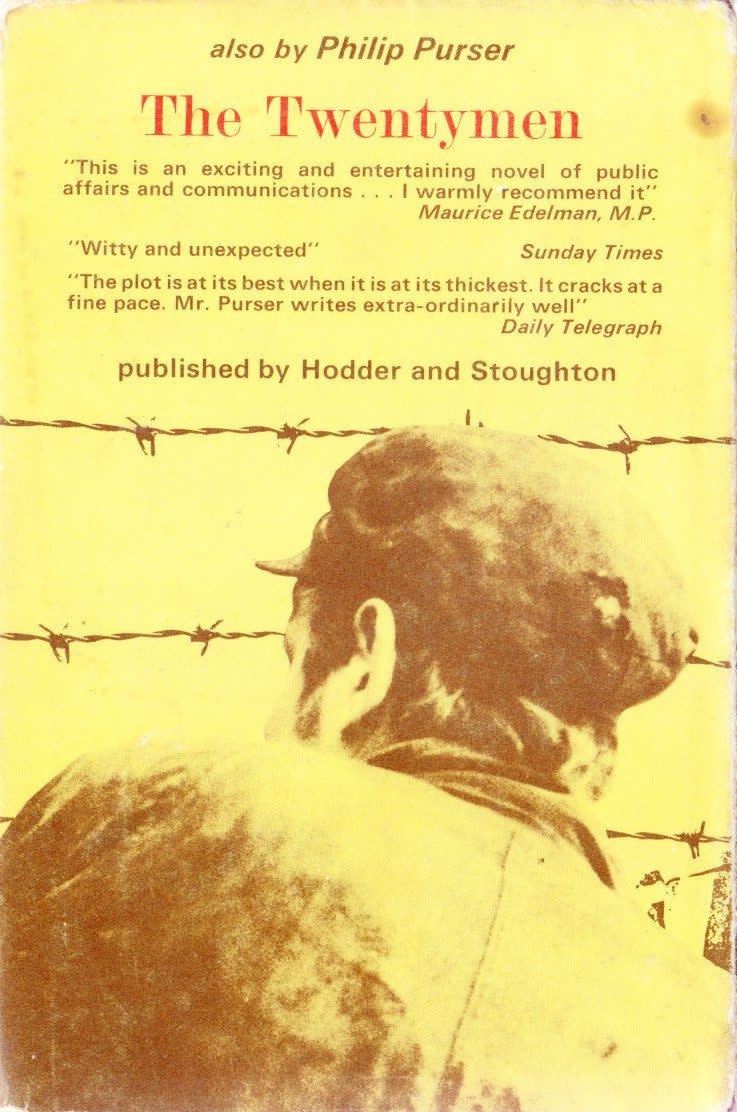Philip Purser, widely admired novelist and Sunday Telegraph television critic who lifted the status of TV reviewing – obituary

Philip Purser, the journalist and novelist who has died aged 96, was for more than a quarter of a century the television critic of The Sunday Telegraph.
A tall, gangling man whose slightly troubled countenance belied his sense of fun and appreciation of the incongruous and fantastic, Purser was treasured by his readers and, more unusually for a critic, was widely admired within the television industry. “His wisdom, knowledge and style, his hatred of trash and his delight in the good make him one of the best of all TV critics,” observed the comedy writer and broadcaster Barry Took.
Purser joined The Sunday Telegraph on its launch in February 1961 as the first new national newspaper since the 1930s; his retainer was £1,500 a year.
He had not been the first choice for the role of TV critic - the editor, Donald McLachlan, had hoped to sign up the blind journalist TE Utley on the grounds that he “wouldn’t be distracted by the pictures” – but in the event Purser did much to cement the new paper’s reputation for lively, intelligent writing.

Television criticism was generally regarded at the time as low in the journalistic pecking order; not long after he joined The Sunday Telegraph, he went to speak about his work at Oxford and one undergraduate asked him: “Does your theatre critic make you feel very inferior?” But Purser himself did much to elevate the standing of TV reviewing.
He could evoke splendidly the style of performers he admired, such as the historian AJP Taylor: “he stepped into the lights, paused for a second, embarked without notes on his lecture and exactly 28 minutes later wound up with an elegant small flourish, like a tight-rope walker reaching safety.”
But he was merciless in his excoriation of the mindless and the confected. Terry Wogan once expressed relief, in a letter to The Sunday Telegraph, that Purser had downgraded his assessment of Blankety Blank to merely “odious” from his previous “despicable”.
He loathed phoniness and despaired of the way in which most performers on television became exaggerated versions of themselves. He once praised the BBC weather forecaster Anne Purvis for displaying no evidence of a personality, only to find that the remark had so upset her that she had returned to work in the back rooms of the Met Office.
He often flew in the face of general opinion, as when he described the beloved hero of Dr Finlay’s Casebook as “one of the few utterly detestable characters in television fiction … smug, self-satisfied, self-righteous [and] a bully”.
It was inevitable, he declared, that this should be one of the favourite programmes of his bête noire Mrs Mary Whitehouse, who appeared frequently on the Sunday Telegraph’s letters page with complaints about Purser’s mockery of her campaign to clean up television. She was particularly incensed when he admitted that on the one occasion they had met he had liked her; she accused him of trying to leaven his criticisms with flattery.

Purser loathed censorship and puritanism, complaining that nudity in the more passionate scenes in television drama was – in that era at least – “not so much conspicuous by its absence as ludicrous in its absence”, and saw it as his role “to stick up for television and its producers against the wowsers and kill-joys”.
He was particularly vehement in his condemnation of political attempts to interfere in programming; Harold Wilson and Mrs Thatcher were the worst offenders.
Although never a solemn writer Purser took these duties seriously, and was critical of the larky new generation of critics, led by Clive James and Nancy Banks-Smith, who were “liable to reach for a joke not to enhance a verdict but to dodge one”.
Nevertheless he could write as wittily as James on the strange byways of television, as when he found a satellite channel devoted to Bavarian sex comedies. “They all take place in the same Alpenland hotel, and feature the same beer-swilling knuckleheads in lederhosen, the same buxom waitresses in dirndls and aprons. A bevy of city girls arrive in flimsy holiday wear which they rapidly lose. The waitresses retaliate by shedding their clothes. After about three of these epics you start to recognise the appendix scars.”

Purser also wrote plays for television and radio, and some excellent novels. The Twentymen (1967) imagined a government taking over the BBC, as it was permitted to do in certain circumstances by the real-life Clause 20 of the BBC licence – he did not know when he wrote the novel that Anthony Eden had once actually tried to invoke the clause.
He had a critical and commercial success with Night of Glass (1968), a superb thriller in which a group of naive Cambridge undergraduates decide to liberate a prisoner from Dachau in 1938, underestimating the barbarity of the Nazis. However, Purser’s next novel, The Holy Fathers Navy (1971), was such a flop that he decided that it would be financially ruinous to continue writing fiction.
There were more novels later on, though, including Friedrich Harris: Shooting the Hero (1990), about a Nazi plot to assassinate Laurence Olivier during the making of Henry V, and Lights in the Sky (2004), a belated sequel to Night of Glass.
Purser occasionally indulged his talent for fiction in the pages of The Sunday Telegraph. A piece he wrote for April Fool’s Day 1966 about watching tram races in his youth prompted a letter from the Tramway Museum Society denying that such events had ever taken place, as well as many missives from delighted readers. He went on to produce more deadpan “reminiscences” in the same vein, collected in The Last Great Tram Race and Other Memoirs (1974).
Philip Purser was born on August 28 1925 in Letchworth Garden City, though the family moved to the Wirral when he was young. His mother was Phyllis Purser, the celebrated postcard artist; his father was in commerce.

Purser was educated at Birkenhead School, and during the Second World War spent six months at King’s College, Cambridge, on an Army short course. In 1944 he joined the Royal Engineers and became a platoon sergeant in a field company aged 20. In one way he regretted not being commissioned, but said that by not going for further officer training he did at least see some action in Italy and north-west Europe before the war came to a close.
After demob in 1947, Purser’s application to return to King’s was rejected by Noel Annan. He spent a spell in Sheffield as an engineering draughtsman before going to the University of St Andrews, where he took his MA in English and Medieval History and acquired a taste for journalism, founding the student newspaper.
In 1950 he joined the Aberdeen Bon-Accord, a pictorial weekly. The following year he switched to the Scottish Daily Mail, and enjoyed a working and social life so hectic that he once fell asleep while interviewing Noël Coward.
In 1955 he returned home unexpectedly to find his flatmate in bed with his girlfriend and fled heartbroken to London – the treacherous pair sent him a piece of their wedding cake which he “propped up sentimentally on the mantelpiece” of his Chelsea bed-sitter, until “I got home one night so late and starving that I ate it”. He was appointed assistant to the Daily Mail’s television critic, Peter Black, who became his mentor.
Occasionally allowed to deputise for Black - prompting one reader to send in a postcard that said “Dear Mr Black/ I’m glad you’re back/ Nothing could be worser/ Than Philip Purser” – he eventually graduated to his own column reviewing the new commercial television channel, while Black stuck to the BBC’s output. Purser then defected to be television critic of The News Chronicle, and was not welcomed back when that paper was absorbed by the Mail in 1960.
He was sounded out for a job at the BBC but had become wary of being institutionalised, and was delighted to be offered the freelance television critic’s job at The Sunday Telegraph. He remained with the paper for 26 years, contributing hundreds of features and interviews as well as his reviews, until in 1987 the new editor, Peregrine Worsthorne, sacked him – Purser never forgave him. He then returned to reviewing for the Daily Mail, and also took on the co-editorship, with Leslie Halliwell, of Halliwell’s Television Companion.
Purser’s other books included a biography of the striptease artiste Phyllis Dixey, based on a drama documentary he had written for Thames Television, and Done Viewing (1992), a memoir of his years as a critic.
He latterly wrote many obituaries - unsigned for The Daily Telegraph and signed for the Guardian. His Guardian obituary of his former Sunday Telegraph colleague Desmond Albrow in 1998 ended: “He is the author, I believe, of my obituary held on file at The Telegraph. I wonder what it says.”
Philip Purser is survived by his wife, the crime novelist Ann Purser (née Goodman), whom he married in 1957, and by their son and two daughters.
Philip Purser, born August 28 1925, died August 1 2022

 Yahoo Movies
Yahoo Movies 
